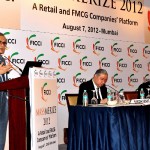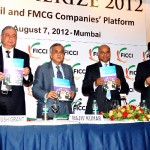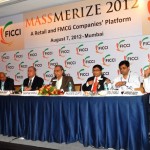For long, the analysts have been betting on strong retail and financial services sector performances to help and power India – Asia’s third-largest economy. Such expectations further get a boost as more and more Indians move towards western-style consumer spending patterns. And, while Fitch, the global ratings agency, has recently opined that Indian consumer spending is at its weakest in seven years, we at FICCI, believe that India’s retail sector will become a USD 1.3 trillion opportunity by 2020. By that time, there will be close to 200 cities with population of over 0.5 million that will fuel retail growth
The estimated value of the Indian retail sector is about USD 500 billion presently. Further, modern retail, which currently stands at 5 percent, will grow about six times from the current USD 27 billion to USD 220 Billion in the next 8 years. We believe that integrated multi-channel retailing will drive consumption in India. Modern retailers have in the past tried to capitalise on this opportunity by increasing their store presence across major cities. Fast moving consumer goods (FMCG) majors, have on the other hand, have tried to enhance distribution reach.
However, achieving these robust growth projections requires the industry to look beyond the conventional brick-and-mortar stores, and consider other avenues like digital and mobile sales. This is because expensive real estate costs are already playing spoilsport for retailers. Real estate costs, especially, high rentals that are in range of 10 – 15% of revenue, render breaking even a daunting task. Retailers need to rethink their business plans and shift a chunk of their sales from stores to alternate low-cost channels. Digital sales points are increasingly becoming a preferred option for retailers. Sales through digital channels, notably websites and mobile applications, which at present are miniscule, will increase to 6-8 % of the total modern retail, by amounting to about USD 13.3-17.6 Billion by 2020.
Time has also come for a more robust and symbiotic relationship between retailers and FMCG companies. FMCG firms have a lot to gain with the advent of multi-channel retailing. However, the depth of retail FMCG collaboration will be one of the key success factors for multi-channel retailing. It is imperative for retailers and FMCG majors to collaborate for assortment planning, replenishment, space planning and promotion as they have a lot to gain.
FICCI Retail & FMCG Committee has recently organized Massmerize 2012, India’s premier conference on retail and FMCG sector in Mumbai. The event registered intense deliberations amongst 50 renowned speakers like Shantanu Khosla, CEO, P&G; Devendra Chawla, President, Future Group; Rakshit Hargave, MD, Nivea; Harkirat Singh, MD, Woodland; William Pinckney, MD, Amway; Mohit Anand, VP, HUL; K. Radhkrishnan, President, Future Fresh Foods; Krishnamohan, CEO, Emami; H.G. Raghunath, COO, Titan, etc. FICCI also released a white paper on “Driving consumption through integrated multi-channel retailing” in association with TCS









Importance of multi-channel distribution is well made, and is an unstoppable trend !
Equally important is enhancing the customer service levels across all channels and the actual experience of the consumer – to make our businesses truly globally competitive.
Towards meeting this goal,we’ve just launched global certification on customer service excellence in India -TISSE2012.
TISSE2012 is a customer service quality standard that goods and service providers can obtain, based on their level of customer centricity. The standard is developed and governed by The International Customer Service Institute, UK (TICSI) and it helps organizations to focus attention, on delivery of excellence in customer service quality.
Organizations in India can now get their business operations and processes certified on TICSI’s benchmarks. And as a consequence, Indian customers can expect more from TISSE certified organizations, as the certification implies that every department of the organization is geared to produce customer satisfaction. Thus, TISSE certification calls for benchmarking of the entire organization – including product groups, sales touch points, manufacturing, distribution, warehousing, packaging, quality control, etc. and not just “Customer Helplines” and the “Customer Service Departments”. Objective customer satisfaction measurement and feedback based continuous improvement, is also a key requirement of TISSE certification.
TISSE is recognized as the global quality mark in the Middle East and more recently has begun to be adopted in Asia, America, Australia and Europe. For the India region, the Gurgaon (Delhi NCR) based management consulting firm Hexagon Analysts & Consulting Services Private Limited (Hexagon Consulting) is the exclusive implementation partner of TICSI, UK (www.TICSI.org) , while their Certification Partner for the final audit leg is the respected British Standards Institution (BSI, India).
Do reach us at contact@hexagonconsulting.co to start an interesting journey, to meet & surpass international standards of customer service excellence and generate high customer satisfaction for your customers !!
The add on to the conference was the networking part with the giants of the industry
The concept was very good i think it was taken into consideration for the first time the collaboration between Retail & FMCG.
The session about Creating Successful Brands was the best, hearing people like Mr William Pinckney and Mr Hakirat Singh was a great pleasure waiting for the next edition
Indeed it was great to see such market and sector giants gather under one roof and discuss the issues related to Retail & Fmcg sector. Great efforts done by FICCI.
The part of the research done by FICCI about the collaboration between Retail & FMCG was the best part of the research which brings a new dimension of the Indian Market infront of everybody.
Indeed the conference was a great success because the issues it dealt with were very serious for the Retail & FMCG sector in India.Eagerly waiting for the next edition of the Summit.